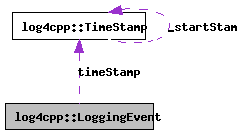
#include <LoggingEvent.hh>
Collaboration diagram for log4cpp::LoggingEvent:

Public Member Functions | |
| LoggingEvent (const std::string &category, const std::string &message, const std::string &ndc, Priority::Value priority) | |
| Instantiate a LoggingEvent from the supplied parameters. | |
Public Attributes | |
| const std::string | categoryName |
| The category name. | |
| const std::string | message |
| The application supplied message of logging event. | |
| const std::string | ndc |
| The nested diagnostic context (NDC) of logging event. | |
| Priority::Value | priority |
| Priority of logging event. | |
| const std::string | threadName |
| The name of thread in which this logging event was generated, e.g. | |
| TimeStamp | timeStamp |
| The number of seconds elapsed since the epoch (1/1/1970 00:00:00 UTC) until logging event was created. | |
When a affirmative logging decision is made a LoggingEvent instance is created. This instance is passed around the different log4cpp components.
This class is of concern to those wishing to extend log4cpp.
| log4cpp::LoggingEvent::LoggingEvent | ( | const std::string & | category, | |
| const std::string & | message, | |||
| const std::string & | ndc, | |||
| Priority::Value | priority | |||
| ) |
Instantiate a LoggingEvent from the supplied parameters.
Except timeStamp all the other fields of LoggingEvent are filled when actually needed.
| category | The category of this event. | |
| message | The message of this event. | |
| ndc | The nested diagnostic context of this event. | |
| priority | The priority of this event. |
| const std::string log4cpp::LoggingEvent::categoryName |
The category name.
| const std::string log4cpp::LoggingEvent::message |
The application supplied message of logging event.
| const std::string log4cpp::LoggingEvent::ndc |
The nested diagnostic context (NDC) of logging event.
Priority of logging event.
| const std::string log4cpp::LoggingEvent::threadName |
The name of thread in which this logging event was generated, e.g.
the PID.
The number of seconds elapsed since the epoch (1/1/1970 00:00:00 UTC) until logging event was created.
 1.5.2
1.5.2